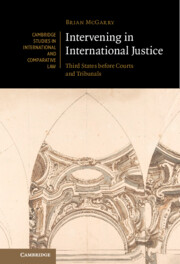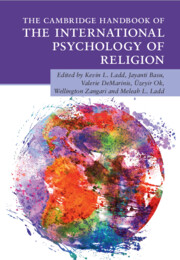Refine listing
Actions for selected content:
1299800 results in Books

An Introduction to Gulf Politics
- Coming soon
-
- Expected online publication date:
- May 2026
- Print publication:
- 31 May 2026
-
- Textbook
- Export citation
Teaching America
- Reflective Patriotism in Schools, College, and Culture
- Coming soon
-
- Expected online publication date:
- May 2026
- Print publication:
- 31 May 2026
-
- Book
- Export citation

Frail Professionalism?
- Lawyers Ethics after the Post Office and Other Cases
- Coming soon
-
- Expected online publication date:
- May 2026
- Print publication:
- 31 May 2026
-
- Book
- Export citation

Celestial Mechanics
- Classical and Modern Methods
- Coming soon
-
- Expected online publication date:
- May 2026
- Print publication:
- 31 May 2026
-
- Book
- Export citation

Holocaust Migration in German Jewish Literatures
- Coming soon
-
- Expected online publication date:
- May 2026
- Print publication:
- 31 May 2026
-
- Book
- Export citation

Fatigue Design of Marine Structures
- Coming soon
-
- Expected online publication date:
- May 2026
- Print publication:
- 31 May 2026
-
- Book
- Export citation
The Cambridge Companion to Pindar
- Coming soon
-
- Expected online publication date:
- May 2026
- Print publication:
- 31 May 2026
-
- Book
- Export citation
Spirituality in Mind
- Psychiatry in a Post-Secular Age
- Coming soon
-
- Expected online publication date:
- May 2026
- Print publication:
- 31 May 2026
-
- Book
- Export citation

Intervening in International Justice
- Third States before Courts and Tribunals
- Coming soon
-
- Expected online publication date:
- May 2026
- Print publication:
- 31 May 2026
-
- Book
- Export citation
Settlement and Risk Assessment in International Commercial Arbitration
- Coming soon
-
- Expected online publication date:
- May 2026
- Print publication:
- 30 June 2026
-
- Book
- Export citation

The Cambridge Handbook of the International Psychology of Religion
- Coming soon
-
- Expected online publication date:
- May 2026
- Print publication:
- 31 May 2026
-
- Book
- Export citation

The Shrikhande Graph
- A Window on Discrete Mathematics
- Coming soon
-
- Expected online publication date:
- May 2026
- Print publication:
- 31 May 2026
-
- Book
- Export citation
Essential Evidence-Based Medicine
- Coming soon
-
- Expected online publication date:
- May 2026
- Print publication:
- 31 May 2026
-
- Book
- Export citation
Inference in Statistical Modelling and Machine Learning
- A Concise Introduction
- Coming soon
-
- Expected online publication date:
- May 2026
- Print publication:
- 31 May 2026
-
- Book
- Export citation
Financial Enterprise Risk Management
- Coming soon
-
- Expected online publication date:
- May 2026
- Print publication:
- 31 May 2026
-
- Book
- Export citation

The Making of the Dominican Liturgy and Its Chant
- Coming soon
-
- Expected online publication date:
- May 2026
- Print publication:
- 31 May 2026
-
- Book
- Export citation
Half a Century of Supergravity
- Bridging between Einstein and the Quantum
- Coming soon
-
- Expected online publication date:
- May 2026
- Print publication:
- 31 May 2026
-
- Book
- Export citation
Gangster of New York
- A Violent Life in Nineteenth Century America
- Coming soon
-
- Expected online publication date:
- May 2026
- Print publication:
- 31 May 2026
-
- Book
- Export citation

The Subura of Rome
- Landscape and Ideology from the Iron Age to the Early Middle Ages
- Coming soon
-
- Expected online publication date:
- May 2026
- Print publication:
- 31 May 2026
-
- Book
- Export citation
The Political Economy of Rwanda's Rise
- Coming soon
-
- Expected online publication date:
- May 2026
- Print publication:
- 31 May 2026
-
- Book
- Export citation
